Correspondence regarding changes in employees at the Carlisle Indian School related to disagreements in the philosophies of William A. Mercer and Richard Henry Pratt.
Pratt, Richard Henry
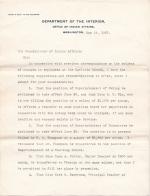
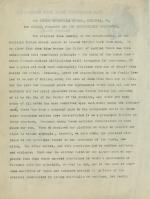
Richard Henry Pratt sends the draft of his pamphlet "The Indian Industrial School, Carlisle, PA. Its Origin, Progress, and the Difficulties Surmounted" to William Miller of the Hamilton Library Association in Carlisle. Pratt notes that his purpose in writing the pamphlet is due to his feeling that government is becoming opposed to non-…
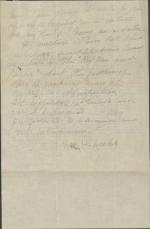
William H. Weeks requests permission from Richard Henry Pratt to enlist him in the U.S. Navy as a sailor.
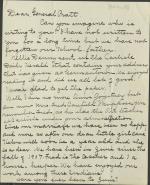
Anna Goyitney Canfield, a former Carlisle student, writes to Richard Henry Pratt giving detailed updates on her life since leaving Carlisle, including her marriage to the former Art Department teacher at Carlisle, Fred Canfield. Canfield also discusses her views of changes at Carlisle since leaving.
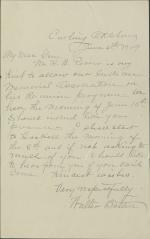
Walter Battice of the Indian Memorial Association writes to Richard Henry Pratt asking for his involvement in an event during a reunion tour for H. B. Peairs.
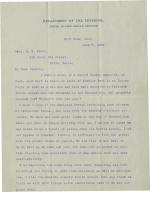
John B. Brown writes to Richard Henry Pratt discussing his recent reading of a story by Captain Jack Hart in which he claims he encountered a former Carlisle student named Charlie Bent in the West in 1865. Brown also discusses his work in Fort Shaw, Montana.
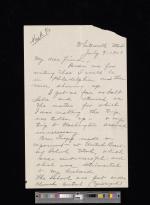
Gertrude Simmons Bonnin (Zitkala Sa) writes to Richard Henry Pratt apologizing for not visiting him as intended, and discussing in detail a political situation between her husband, Raymond Talephause Bonnin, and employees at the Uintah Boarding School, including elements of religious tensions and racism.
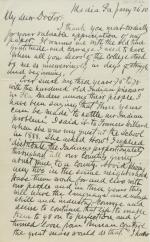
Richard Henry Pratt thanks Dr. Charles Francis Himes for his comments on his paper and his previous support from Dickinson College. Pratt comments on his work at the Carlisle Indian School and the formation of his policy at Fort Marion. Further, he details the outing program and its benefits for assimilation compared to the new policy of native…
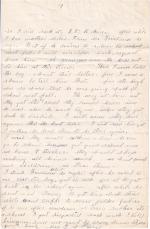
These materials include correspondence regarding the forced return of Seneca Clark Cook by Carlisle's disciplinarian, Wallace Denny. Cook's grandmother, Mrs. E. A. Pierce, wrote to the Indian Office complaining about the treatment of her grandson by the school, including specific complaints against Denny's treatment of students.
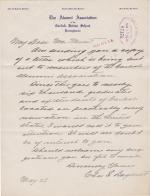
These materials include correspondence regarding the Alumni Association of the Carlisle Indian School including its new constitution, a new building in Carlisle, and other news.
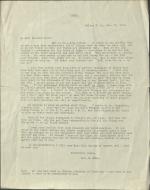
James H. Bell writes to Richard Henry Pratt thanking him for his work in supporting planning for a Wanamaker expedition stop in New Mexico. Bell promises to repay Pratt for his personal expenditure for his work, and praises him highly for his support and that of his friends. Bell also notes that Mr. and Mrs. Paul A. Walter send their regards.…
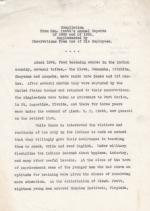
Nell C. Splitstone, children's editor of The People's Home Journal, asks the Department of the Interior for a complete record of former Superintendent Richard Henry Pratt's time at the Carlisle Indian School.
Acting Commissioner of Indian Affairs F. H. Abbott informs Splitstone of Pratt's address and sends them the Report…
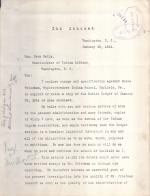
These documents include a letter from Richard Henry Pratt to the Commissioner of Indian Affairs Cato Sells about an article published in The Public Ledger in January of 1914. Titled "General Pratt Alleged to be Seeking Revenge on Moses Friedman," the article is deemed a "malicious, false and slanderous accusation" by Pratt who blames…
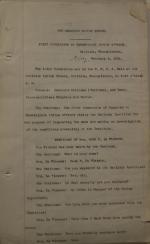
The typed transcript of Rosa B. La Flesche's testimony before the Joint Commission to Investigate Indian Affairs. At the time La Flesche worked at Carlisle as the Outing Manager, though she previously attended the school under the name Rosa Bourassa.
In her testimony La Flesche critiques Superintendent Friedman's administration in regards…
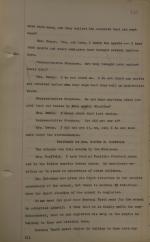
The typed transcript of Bertha Canfield's testimony before the Joint Commission to Investigate Indian Affairs. At the time Canfield oversaw the sewing room at the school.
In her testimony Canfield critiques the administration of Superintendent Friedman on the basis that he does not take any interest in the well-being or morality of the…
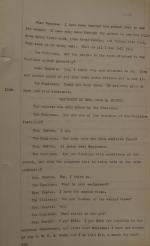
The typed transcript of Emma H. Foster's testimony before the Joint Commission to Investigate Indian Affairs. At the time she worked as a teacher at Carlisle.
In her testimony Foster explains what she thinks is the cause of the friction between the students and school administration. She also answers questions about the use of corporal…
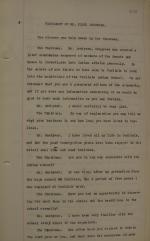
The typed transcript of Fisk Goodyear's testimony before the Joint Commission to Investigate Indian Affairs. (His name is spelled Fiske Goodyear in this transcript.) At the time Goodyear was working at a local coal and lime business, but had previously worked at Carlisle as storekeeper and clerk in the 1890's.
In his testimony Goodyear…
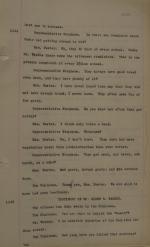
The typed transcript of Glenn S. Warner's testimony before the Joint Committee to Investigate Indian Affairs. At the time Warner was working as the athletic director at the school.
In his testimony Warner answers questions about the formation and financial dealings of the Carlisle Athletic Association. He also discusses an incident of…
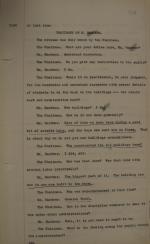
The typed transcript of H. Gardner's testimony before the Joint Commission to Investigate Indian Affairs. At the time Gardner worked as an assistant carpenter at the school.
In his testimony Gardner expresses his opinion that if the male students were not sent on outing they could instead build buildings for the school. This would save…
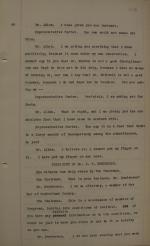
The typed transcript of J. W. Henderson's testimony before the Joint Commission to Investigate Indian Affairs. At the time Henderson lived next door to the school.
In his testimony Henderson says that he has rarely seen a Carlisle student intoxicated and has rarely had problems with unruliness on the part of the students.
In the…
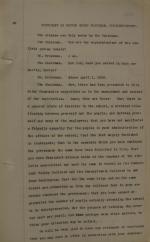
The typed transcript of Moses Friedman's testimony before the Joint Commission to Investigate Indian Affairs. At the time Friedman served as the Superintendent for the school.
In his testimony Friedman argues that incompetent or antagonistic employees are the root cause of the poor conditions at the school. He answers questions about his…
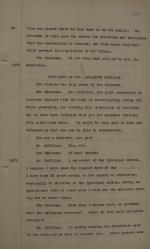
The typed transcript of Rev. Alexander McMillan's testimony before the Joint Commission to Investigate Indian Affairs. At the time McMillan was one of the local clergy who contracted their services to the school.
In his testimony McMillan answers questions from the Commission about his awareness of certain problems at the school. He…
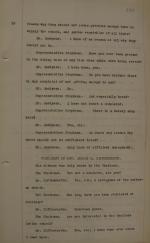
The typed transcript of Rev. George Diffenderfer's testimony before the Joint Commission to Investigate Indian Affairs. At the time Diffenderfer contracted with Carlisle to preach sermons on a semi-regular basis. He had previously served as the school chaplain.
In his testimony Diffenderfer begins by clarifying his different connections…
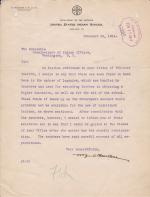
These materials include financial documents, legal documents, and correspondence concerning multiple financial concerns of the school, such as railroad bonds, legacy trust funds, fundraising, donations, and checks for minors.
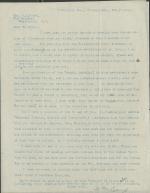
W. M. Camp writes to Richard Henry Pratt over two letters discussing a variety of topics related to the Carlisle Indian School, including the impact of Commissioner of Indian Affairs Francis Leupp, the early history of the school, and negative press coverage of former Carlisle students.
